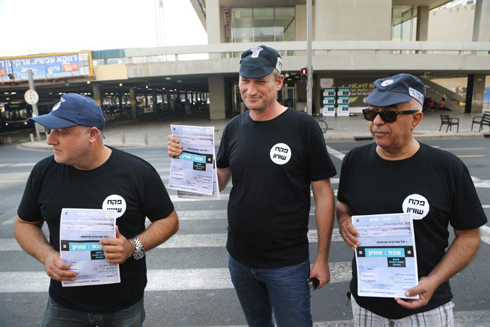
When the Knesset convenes for its winter session next month, the coalition's strength will be tested on the topic of religion and state.
Following the public outrage over Interior Minister Gideon Sa'ar's decision to start handing out fines to Tel Aviv supermarkets that open on Shabbat, MKs Ruth Calderon (Yesh Atid) and Elazar Stern (Hatnua) are going to propose a bill titled "Shabbat in the public space."
The proposed bill, first revealed on Ynet, is based on the 2003 Gavison-Medan Covenant for coexistence between religious and secular Jews in Israel. The Covenant grants the authority to municipalities to act for the public that does not keep the Shabbat, including operating public transportation and opening community centers during the weekend, much like synagogues that are opened for the religious public. At present, most of the community centers are closed on Saturdays.
In addition, the proposal would permit the opening of cultural centers, including restaurants and cafes. The scope of the cultural centers' activity will be determined by the municipality, and not by the Interior Minister, the proposal stipulates.
The current labor legislation states that working on the Shabbat in workshops, factories and trade is forbidden and these businesses cannot employ workers on Shabbat unless they obtain a special permit from the Economy Minister.
The new proposed legislation adds two amendments: Firstly - local municipalities would be able to set a limited framework for the opening of market stores and pharmacies pending on the Interior Minister's authorization, and secondly - recreational and cultural businesses would all be permitted to open on Saturdays, in a way that does not permit infringing upon this sort of activity.
The opening of community centers on Saturdays is an unusual issue that is expected to cause political controversy.

The proposal differentiates between state and public institutions and stipulates that state institutions will be closed on Saturdays, except for those dealing with the public's health and safety.
On the other hand, recreational public places like theaters, museums, national parks, zoos, community centers, cafes etc. will be opened on Shabbat and provide an option for pay for the activity before Shabbat enters, so traditional Jews could enjoy these activities as well. The places in which activity is permitted on Shabbat and the times of these activities will be determined by the individual municipalities.
As for industrial and trade activities - as a general rule, this type of activity will not be permitted in the labor legislation, excluding hotels and similar institutions that are already permitted to operate under the existing law.
The bill's co-signers Calderon and Stern state that the Israeli secular public currently has no organized places to go do on the Shabbat with their families in order to pass the holy day in a meaningful manner with their communities. The legislation would allow a mass consumption of a variety of recreational activities, the bill's proposers say.
The proposal maintains any worker's right not to work on Shabbat, and bars employers from discriminating against an employee based on the latter's decision not to work on the Jewish day of rest. Meanwhile, Jewish employees who want to work on Shabbat would be permitted to.
The proposal also seeks to offer a solution to the dispute over public transportation on Saturdays, claiming the freedom of movement during the Shabbat must not be infringed upon.
Operating public transportation on Shabbat will be done via franchise holders who will have to receive authorization from the Transportation Ministry. If the Transportation Minister decides not to grant licenses for municipalities interested in operating public transport on a Saturday, the minister will have to provide a detailed explanation to the decision.
"The fight for the Shabbat is not a fight over market stores," MK Calderon said. "This is a fight for the Jewish character of Tel Aviv, the first Hebrew city, and for the entire Jewish-Israeli culture. The secular majority may be restrained, but they won't allow for their right to live a free Jewish life based on their own views to be taken away from them."
Calderon went on to say that "it is time the state outlines principles of conduct on Saturdays in a way that allows all of the communities in Israel to maintain the values of Shabbat in their own ways, while giving it a clear expression in the main legislation. The proposal seeks, for the first time, to create a reality that recognizes the secular public's rights on Shabbat as well, and the objective of the bill is to allow co-existence with mutual respect."
MK Stern said that "The Shabbat is a gift the Jewish nation received from God. The alienation from Jewish values on the one hand, and the complete disregard of the different facets of Israeli society on the other hand, are causing an ever-increasing gap between Israeli and Jewish identities. The bill we intend to propose will strengthen the unique nature of Shabbat among the Israeli public while truly dealing with the desire to maintain the nature of the state of Israel as a Jewish state, while also maintaining its democratic nature."

















